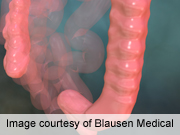healthnewslink
Cancer Newsletter
August 20, 2012 |
| In this Issue |
|
|
|
|
Drug May Aid People With Advanced Thyroid Cancer
First treatment for this deadly form of the disease, researchers say
 MONDAY, Aug. 13 (HealthDay News) -- A new study shows that the chemotherapy drug vandetanib (Caprelsa) may extend life a bit for some thyroid cancer patients.
The results of phase 2 trials showed that patients taking the drug lived for 11 months without the cancer progressing, compared with six months for those receiving a placebo.
"This study is confirmation that vandetanib is effective in advanced thyroid cancer patients, not only in terms of overall response, but also in terms of progression-free survival," said lead researcher Dr. Martin Schlumberger, of the Institute Gustave Roussy in Villejuif, France. "Vandetanib should be used as first-line treatment in patients with progressive, untreatable thyroid cancer."
The report was published online Aug. 13 in the journal The Lancet Oncology.
For the study, Schlumberger's team randomly assigned 145 patients with late-stage thyroid cancer either to vandetanib or a placebo.
In addition to a longer period when the cancer didn't progress, patients taking vandetanib had their disease better controlled, with more patients having a complete or partial response to the drug, the researchers found.
Among patients taking the drug, 72 percent had disease progression, compared with 84 percent taking placebo.
Neither those taking vandetanib or placebo, however, showed better overall survival, the researchers noted. Among those taking vandetanib, 26 percent died; 29 percent of those taking a placebo died.
Patients with papillary thyroid cancer -- the most common type of thyroid cancer -- taking vandetanib had progression-free disease for an average of 16 months, compared with patients with rarer forms of cancer, where progression-free disease lasted an average of almost eight months.
Patients taking vandetanib had greater side effects, including abnormal heart rhythms (which can be deadly), diarrhea, weakness and fatigue. Two patients taking vandetanib died from the treatment, the researchers noted.
Vandetanib works by targeting three proteins known to play a role in the growth and spread of thyroid cancer.
For people without health insurance, a month's supply of vandetanib can cost more than $17,800, according to the American Society of Clinical Oncology. For those with insurance, co-pays vary by plan.
If caught early, thyroid cancer is often curable. "Typically, we talk about thyroid cancer being the great cancer," said Dr. Dennis Kraus, director of the Center for Head & Neck Oncology at Lenox Hill Hospital in New York City. "If you've got to have a cancer, this is the one."
In most cases, the risk of dying from thyroid cancer is 1 percent, Kraus noted. Treating the disease usually involves surgically removing the thyroid and the lymph nodes if they are involved. In addition, patients can receive radioactive iodine.
"It's only the minority of patients who ... develop recurrent disease or metastatic or locally advanced cancer, who go on to die of their disease," Kraus said.
With vandetanib, these types of patients may have improved survival, Kraus said.
"It's not a panacea," he said. "But in a group in which we thought we had no viable treatment, we now have something we can try to treat people with and either control their disease or prolong their survival."
More information
For more on thyroid cancer, visit the U.S. National Library of Medicine.

|
Genes May Be Key for Patients With Multiple Colon Polyps
In the future, genetic screening may be advised for those prone to inherited disorder, study suggests
 TUESDAY, July 31 (HealthDay News) -- A new study finds a strong correlation between certain genes passed down through families and the odds of multiple colon polyps discovered by colonoscopy.
The findings could point the way to deciding who will benefit from gene testing when assessing risks for colon cancer, the study's authors said.
Two "germline mutations" -- DNA changes passed down from parent to offspring -- are often implicated when multiple colorectal adenomas (polyps) are found in people with a condition called familial adenomatous polyposis, noted a team led by Dr. Shilpa Grover, of Brigham and Women's Hospital in Boston.
However, there is no consensus on when genetic testing for the two genes, known as APC and MUTYH, should be done.
In the new study, published in the Aug. 1 issue of the Journal of the American Medical Association, Grover and colleagues looked at data on almost 8,700 people who had undergone full genetic mapping between 2004 and 2011.
The researchers found that 80 percent of people with 1,000 or more polyps also carried the APC mutation, whereas just 2 percent carried the MUTYH mutation. Rates of the APC mutation were also much more prevalent than MUTYH among people with between 100 and 999 polyps, the study found.
However, the rate of either of the mutations was similarly low (estimated at 10 percent of patients or less) for people with fewer adenomas (between 10 and 99 polyps).
The bottom line: The number of colorectal polyps a patient had "was strongly associated" with the presence or absence of these genetic mutations, the researchers said.
Based on the finding, the investigators reasoned that testing for APC or MUTYH might be considered for anyone with 10 or more polyps detected on colonoscopy. "However, our results are derived from a selected cohort [group] of high-risk individuals and need to be validated in larger populations of unselected patients," the researchers added in a journal news release.
Two experts said the information in the study was valuable.
"This study is important because it helps to correlate the number of colon polyps with genetic testing for certain genetic abnormalities," said Dr. David Feldman, an attending physician at Beth Israel Medical Center in New York City.
Familial adenomatous polyposis "causes many polyps and usually [when] untreated leads to colon cancer before age 40," he added. "The study's findings may be helpful in counseling people with familial adenomatous polyposis and family members, and could lead to changes in the future in screening for polyps in people with [the condition] and families of these patients."
Another expert cautioned, however, that it's still too early for concrete recommendations on genetic testing for patients at risk of colon cancer.
"This study suggests that patients with 10 or more adenomas be considered for genetic testing, [but] this recommendation needs to be carefully considered in the context of the patient population evaluated in this study and the potential positive or negative effects of genetic testing," said Dr. David Bernstein, chief of hepatology and acting chief of gastroenterology at North Shore University Hospital in Manhasset, N.Y.
And Feldman noted that while many people will have a positive finding of polyps on colonoscopy, familial adenomatous polyposis remains relatively rare.
"Colon polyps are found commonly in people undergoing screening colonoscopy. Up to 85 percent of people undergoing a screening colonoscopy will be found to have colon polyps," he said. "Less than 10 percent of these patients found on screening colonoscopy will have familial adenomatous polyposis. Most patients with colon polyps will have sporadic polyps for which no genetic testing is currently available."
More information
There's more on familial adenomatous polyposis at the U.S. National Institutes of Health.

|
Untreated Heartburn May Raise Risk for Esophageal Cancer, Study Says
Obesity, poor diet contribute to acid reflux, which is sometimes linked to the deadly disease
 WEDNESDAY, July 25 (HealthDay News) -- Rates of esophageal cancer have surged due to a lack of awareness about what causes the disease and how it can be prevented, experts say.
The esophagus is the muscular tube that carries food and liquid from the mouth to the stomach. There were six times as many cases of esophageal cancer in 2001 as there were in 1975, according to a team from the University of California, Los Angeles. The researchers noted that one key way people can reduce their risk for the disease is by managing heartburn and acid reflux, often called gastroesophageal reflux disease, or GERD.
"Obesity and poor diet have spiked the numbers suffering from acid reflux," Dr. V. Raman Muthusamy, associate clinical professor of medicine and endoscopy director at the UCLA Center for Esophageal Disorders, said in a university news release.
If left untreated, GERD can cause stomach acid to wash repeatedly into the esophagus, causing changes in the tissue lining. This condition is called Barrett's esophagus, and people diagnosed with Barrett's may be up to 40 times more likely to develop esophageal cancer, the UCLA experts explained.
Complicating matters, people with esophageal cancer may not experience any symptoms other than heartburn, which could prevent early detection of the disease, said Muthusamy and his colleague Dr. Kevin Ghassemi, clinical programs director at the UCLA Center for Esophageal Disorders.
"Early identification, treatment and management of changes in the esophageal lining are critical to catching problems early," Ghassemi said in the news release.
To help people know when to be concerned about acid reflux or heartburn and reduce the risks associated with the condition, Muthusamy and Ghassemi offered the following tips:
- Anyone experiencing heartburn more than once a week should visit their doctor to manage the condition.
- Lose extra pounds. Being overweight can make acid reflux and heartburn worse.
- Avoid eating too much at one time, and keep upright after eating. Reclining with a full stomach can make symptoms worse.
- Engage in light physical activity after eating; exercise can help digestion.
- Anyone who takes medications for acid reflux -- such as Prilosec, Nexium, Prevacid, Zantac or Pepcid -- should take their medication regularly to reduce the level of acid in their stomach.
- Get screened for esophageal cancer. White men aged 50 or older who have been affected by acid reflux for more than 10 to 15 years should consider being screened for Barrett's esophagus. If caught early, the changes in the esophagus lining can be treated.
- Don't smoke.
- Avoid caffeine, alcohol and fatty foods, which can increase the risk for acid reflux.
- People taking certain heart and blood-pressure drugs, such as calcium channel blockers and nitrates, may be at greater risk for acid reflux. These patients should discuss their risk factors and treatment options with their doctor.
- Don't wear tight-fitting clothes.
The American Cancer Society estimates that there will be nearly 17,500 new cases of esophageal cancer in the United States in 2012, and more than 15,000 deaths from the disease.
More information
The U.S. National Cancer Institute has more about esophageal cancer.

|
Chemo During Pregnancy Doesn't Seem to Harm Newborn
More research needed on the long-term effects of chemotherapy exposure in the womb, expert says

WEDNESDAY, Aug. 15 (HealthDay News) -- Women who need chemotherapy for breast cancer during pregnancy should not compromise their treatment or deliver their babies early, a new study says.
In the study, published online Aug. 15 in The Lancet Oncology, researchers in Germany found that babies born to breast cancer patients who had chemotherapy while they were pregnant were not at greater risk for complications. They also found that the babies who did suffer from complications were premature, regardless of whether or not they were exposed to chemotherapy.
"Our findings emphasize the importance of prioritizing a full-term delivery in women who undergo chemotherapy while pregnant," study leader Sibylle Loibl, of the German Breast Group, said in a journal news release.
"Illness and mortality in newborn babies is directly related to gestational age at delivery," Loibl stressed. "This is an important clinical message because the decision to deliver the fetus preterm is often taken without medical indication. Our work suggests that treating patients with breast cancer while pregnant is possible, and there is no need to interrupt the pregnancy or receive inferior therapy."
In conducting the study, the researchers examined more than 400 European women diagnosed with early stage breast cancer while they were pregnant. Of these women, 48 percent underwent chemotherapy during their pregnancy.
The infants exposed to chemotherapy in the womb had, on average, a lower birth weight than other infants who were not exposed to the cancer drugs, the study found. The authors pointed out, however, that that was about the only noticeable difference among the babies, and the number of chemotherapy cycles the women received did not appear to affect their babies' birth weight.
Complications among the infants were more often associated with preterm delivery, regardless of exposure to chemotherapy in the womb, the researchers noted. Half of the women in the study delivered prematurely. Of these, 23 percent gave birth before they were 35 weeks pregnant. In comparison, about 10 percent to 15 percent of infants are born preterm in the general population, Loibl pointed out in the news release.
"If our findings are confirmed by other studies, breast cancer during pregnancy could be treated as it is in nonpregnant women without putting fetal and maternal outcomes at substantially increased risk," Loibl concluded.
In response to the study's findings, Dr. Olivier Mir, of the Cancer Associated with Pregnancy Network in France, said more research is needed to determine the best chemotherapy doses for pregnant women as well as the long-term risks children face from having been exposed to the cancer drugs in the womb.
More information
The U.S. National Library of Medicine has more about chemotherapy.

|
| Copyright © 2012 ScoutNews, LLC. All rights reserved. |
|